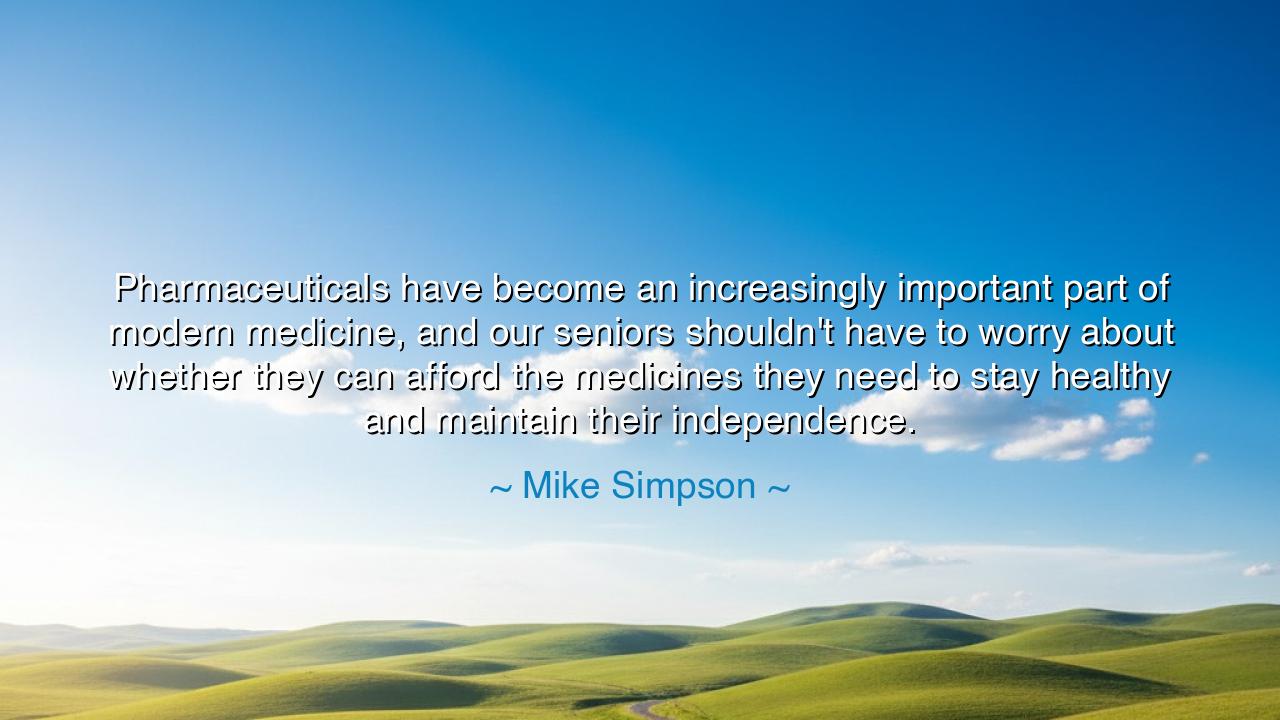
Pharmaceuticals have become an increasingly important part of
Pharmaceuticals have become an increasingly important part of modern medicine, and our seniors shouldn't have to worry about whether they can afford the medicines they need to stay healthy and maintain their independence.






Hear the words of Mike Simpson, spoken with compassion and foresight: “Pharmaceuticals have become an increasingly important part of modern medicine, and our seniors shouldn’t have to worry about whether they can afford the medicines they need to stay healthy and maintain their independence.” Within this statement lies not only a concern for the body, but a call to conscience—a reminder that the strength of a nation is measured not by its wealth, but by how it cares for those who have borne its burdens. His words speak of medicine, but their soul is justice; they speak of independence, but their heart is dignity.
In the age of the ancients, healers were revered as servants of both gods and men. Their craft was sacred, for it bound the realm of suffering to the realm of mercy. Yet in our time, the art of healing has become entangled in the web of commerce—a place where miracles of science meet the heavy price of survival. Simpson’s voice arises as a plea against this imbalance, for he sees that pharmaceuticals, though born of human genius, have grown into a burden upon the very people they were meant to save. The elders, who once built the foundations of their nations, now stand trembling before the counter of the apothecary, wondering if they must choose between health and sustenance.
The ancients would have called this a failure of stewardship. For in every just society, the aged are its crown—the living memory of its struggles, the bearers of wisdom. To neglect them in their hour of need is to break faith with the generations that came before. Recall the words of Cicero, who said that “the old should be lightened of their burdens, for they have carried the load of life.” To leave the elderly to battle illness alone, their hands tied by the chains of poverty, is to dishonor that sacred covenant between youth and age, between labor and rest.
There is a story told of the ancient Chinese physician Sun Simiao, known as the “King of Medicine.” He once wrote that the true healer must treat every patient with equal care—whether noble or poor, young or old—because “the heart of medicine is compassion.” In this, he foreshadowed the very principle Simpson defends: that access to healing should not depend on wealth, and that no elder should lose their independence for lack of a pill that could restore their strength. For what is independence, if not the freedom to live without fear?
Simpson’s words also remind us that independence is more than a political idea—it is the essence of human dignity. To lose it through illness or deprivation is to lose a part of the soul. When an elder cannot afford their medicine, they are robbed not only of health but of autonomy—the ability to rise each day and care for themselves, to live without dependence upon others. The ancients believed that freedom was the highest form of health; that the mind and body were one, and that the weakening of either diminished the whole person. Thus, to restore the health of our elders is to restore their freedom, and through them, the moral health of society itself.
But let us not hear these words as mere lamentation. They are also a call to action. Simpson’s vision demands that we, the inheritors of modern progress, reclaim our sense of responsibility. Governments must see that healthcare is not a privilege, but a trust; that pharmaceuticals, though crafted by innovation, must serve humanity rather than enslave it. Communities must lift their elders as once those elders lifted them. And each of us, in our own small way, must choose compassion over convenience—by caring for our aging parents, by speaking for those too weary to speak, and by shaping a world where medicine heals both body and society.
The lesson, then, is this: A civilization that prizes profit above people may gain riches, but it loses its soul. The true measure of progress is not how far technology advances, but how deeply mercy extends. Let us ensure that the gifts of modern science do not become chains of inequality. Let every elder rest without fear, knowing that their health and independence are protected by the gratitude of those who follow them. For in honoring them, we honor the past—and we preserve the spirit of humanity that binds all ages together.
Thus, remember Mike Simpson’s words as a covenant: that the fruit of progress must never be withheld from those who planted its seeds. When we care for our elders, we care for the future that waits for us all. And in doing so, we become the kind of people who deserve the blessings of both health and freedom.






AAdministratorAdministrator
Welcome, honored guests. Please leave a comment, we will respond soon